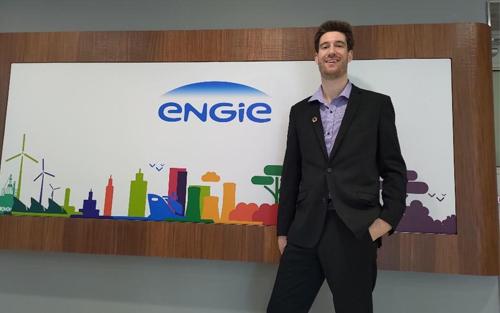

In February 2019, Engie Vice President Frank Bruel gave a talk at Sciences Po Paris. Before that talk, the Sciences Po Career Center and Engie had organized an HR corner. There, I asked one of the representatives about opportunities with Engie in China, since I knew I would be there soon, and gave them my CV. My documents were passed on and, a few days later, I had a first phone interview with someone from Engie China – this person is my supervisor now.
Currently, I am working on two projects. First, I am drafting the Corporate Social Responsibility (CSR) Report for 2019, in which we illustrate each department’s contributions to Engie’s CSR goals, which are mapped against the Sustainable Development Goals. This means reaching out to managers from different areas and sit together to reflect on how they embraced sustainability in their business activities.
Second, I work on green bonds. Since Engie is investing in wind, solar and energy efficiency in China, many projects are likely to qualify for green bonds. My job is to do in-depth analysis to verify if the investments meet Engie’s green criteria. For example, I calculated how many tons of CO2 were saved through a distributed solar PV project.
Working on and for the future. In the coming years, the world will need to shift rapidly from fossil to renewable energy sources. Directly to contribute through my job to this issues is like building our future. Given that Engie’s vision is to lead the zero-carbon transition, I have the privilege to work with a motivated team that takes actions that will accelerate the energy transition. For example, when I support marketing and business development activities, I know that this will lead to solar and wind power capacity additions.
I rely on both hard and soft skills I have learned at PSIA. In the Environmental Policy Master, I took a few courses on renewable energy, which are useful to understand Engie’s business operations and the policy environment we operate in. Furthermore, I became more familiar with the technical aspects of ecology and climate change. This knowledge comes in handy in my CSR tasks, especially when I am analyzing the environmental impact of a project.
Regarding soft skills, it was valuable to get to know the French language and culture, which can be useful (sometimes, as we work mostly in English) in the Beijing office of a French international company. Moreover, being part of the international student body at PSIA equipped me with the necessary intercultural skills to navigate in a foreign environment – and China can sometimes be a bit foreign to me.
Combine impact with career success. The best choice for your career doesn’t mean compromising on your moral principles. By contrast, the two can reinforce each other. To give an example, I was en route to do a well-paid internship in a company that had a weak sustainability record after my Bachelor’s. However, I felt it difficult to get motivated for this job and I would have probably performed very poorly. So, I shifted directions and started my degree at Sciences Po. Today, my goal is to work on solving global environmental challenges. This not only gives me a clear idea of what to do in my life, but also a strong drive to progress professionally.